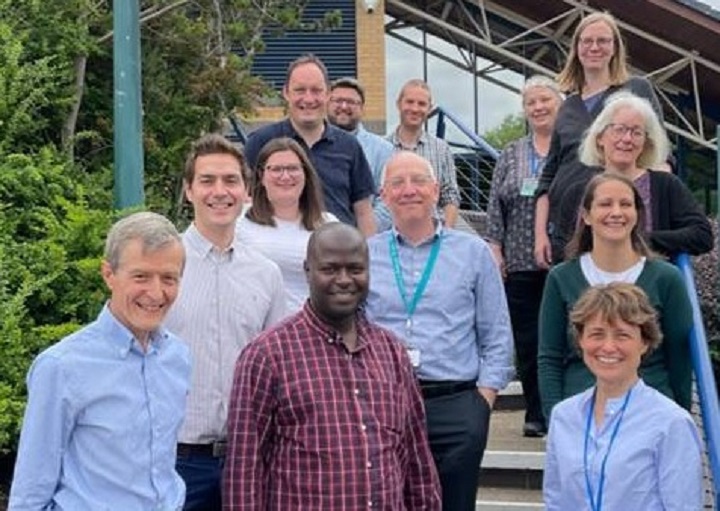ENERGISE Project
Improving tolerance for FODMAPs using modified celluloses: defining the role of gelation in reducing gas production in vitro and in vivo MRC funded Experimental Medicine Grant starting 2022.
Healthy dietary fibres can have undesirable effects on the bowel. We want to find a way to overcome these effects by combining different types of fibres to retain the beneficial effects of the fibres whilst minimizing the undesirable effects.
Although fibre is known to be an important part of our diet, we eat too little of it for our health. In part, this is because of the discomfort that can arise from consuming it, including bloating as a result of gas build up in the digestive system. A group of dietary carbohydrates called FODMAPs are rapidly fermented in the large bowel (colon) producing gases as we have shown recently using MRI (Magnetic Resonance Imaging). Low FODMAP diets improve IBS symptoms but such diets are difficult to follow and may have undesirable effects on gut bacteria.
Psyllium, a commonly prescribed fibre improves IBS patients’ symptoms and reduces the rise in colonic gas volumes after consuming a commonly dietary FODMAP called inulin. Psyllium is a dietary fibre which forms a gel when added to water but we do no know exactly how psyllium alters colonic fermentation. We have developed a laboratory model colon which simulates conditions in the colon and allows us to measure the breakdown products of inulin including gas, something very difficult / impossible in actual patients because the colon is so inaccessible.
We believe that psyllium acts by forming a gel, trapping inulin thereby excluding colonic bacteria and hence slowing and redirecting colonic fermentation to produce less gas but more short chain fatty acids (SFAs). This could retain the metabolic benefits associated with SCFAs (reducing obesity / type II diabetes) while reducing adverse effects associated with excessive gas. Celluloses are safe, inexpensive dietary fibres, already widely used in the food industry which can be modified to vary viscosity and the ability to form gels to allow us to compare the effect of viscosity (resistance to flow) with that of gel formation using chemically similar substances. Gels are likely to exclude bacteria in a way that increased viscosity alone will not do.
We will investigate the effects of celluloses on fermentation of carbohydrates using a model colon, in vivo MRI, stool samples and a Smart pH Pill. We will then investigate how these celluloses affect bowel symptoms in patients with IBS.
Our Team

The Energise team (Left to right, bottom to top)
Robin Spiller, Professor of Gastroenterology, Nottingham NIHR Biomedical Research Center.
"I have a long term interest in disorders of brain gut interaction especially IBS patients for whom this project is particularly relevant."
Abdulsalam Aliyu, Research Associate, Nottingham Digestive Diseases Centre, University of Nottingham.
"I have an interest in gastrointestinal physiology and pharmacology with focus on gut responses to food and drug formulations using MRI and gut peptides."
Maura Corsetti, Associate Professor of Gastroenterology, Nottingham NIHR Biomedical Research Centre.
"I have dedicated my career to the study of the causes of IBS and in particular the role of alteration of bowel motility."
David Gunn, Research Fellow in Gastroenterology, Nottingham Digestive Diseases Centre and Nottingham NIHR Biomedical Research Centre.
"I have an interest in the effects of fibre on the gut, both in diseases and in health."
Luca Marciani, Professor of Gastrointestinal Imaging, Nottingham Digestive Diseases Centre and Nottingham NIHR Biomedical Research Centre.
"I have a particular interest in in-body imaging of foods, beverages, dosage forms and formulations, intestinal fluid distribution and the development of medical devices and novel MRI tests for GI motility and transit."
Caroline Hoad, Senior Research Fellow, Sir Peter Mansfield Imaging Centre, University of Nottingham.
"I work on developing MRI methods and analysis techniques with a particular interest in applications in the abdomen and pelvis."
Hannah Harris, Research Scientist, Food, Innovation and Health, Quadram institute, Norwich.
"I am interested in using in vitro models look at how fibre can influence gut bacteria, their metabolites, and how this affects health."
Penny Gowland, Professor of Physics, Sir Peter Mansfield Imaging Centre, University of Nottingham.
"I work on developing novel MRI methods for monitoring biomedical phenomena particularly in the gut."
Fred Warren, Group Leader, Food, Innovation and Health, Quadram Institute Norwich.
"I am interesting in modelling in vitro digestion processes of carbohydrates and studying their impact on the gut microbiome."
Neele Dellschaft, Research Fellow, Sir Peter Mansfield Imaging Centre, University of Nottingham.
"I have been working on GI MRI projects for five years and will be coordinating this project."
Gleb Yakubov, Associate Professor of Food Science, Food Structure and Biomaterials Research Division, Soft Matter Biomaterials and Biointerfaces Lab.
"I have a long standing interest in biophysical mechanisms of dietary fibre functionality. Our team is contributing expertise in food structure design, formulation and analysis of complex carbohydrates."
Colin Crooks, Clinical Associate Professor in Gastroenterology, Nottingham Digestive Diseases Centre and Nottingham NIHR Biomedical Research Centre.
"I am a clinical statistician and epidemiologist providing statistical analysis and study design support."
Debbie Bush, GI Clinical Physiologist, Faculty of Medicine & Health Sciences, University of Nottingham.
"I have a long association with the support of MRI gut projects. My interests are in disorders of the gut-brain interaction, particularly IBS and gut motility."
Other members
Alaa Alhasani, PhD student in Gastroenterology, Nottingham Digestive Disease Centre, School of Medicine, University of Nottingham.
"I am Clinical Dietician and am interesting in manipulating and modulating different fibres structures and functions to create a novel dietary treatment for patients with IBS."
Joshua Reid, Research Fellow, Food Structure and Biomaterials Division, Soft Matter Biomaterials and Biointerfaces Lab.
“I am passionate about understanding the molecular behaviour of dietary fibres in solution and how this can impact their nutritional properties.”